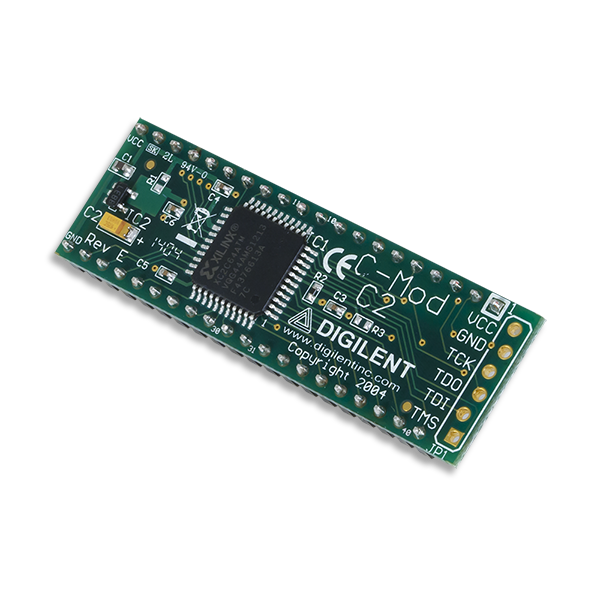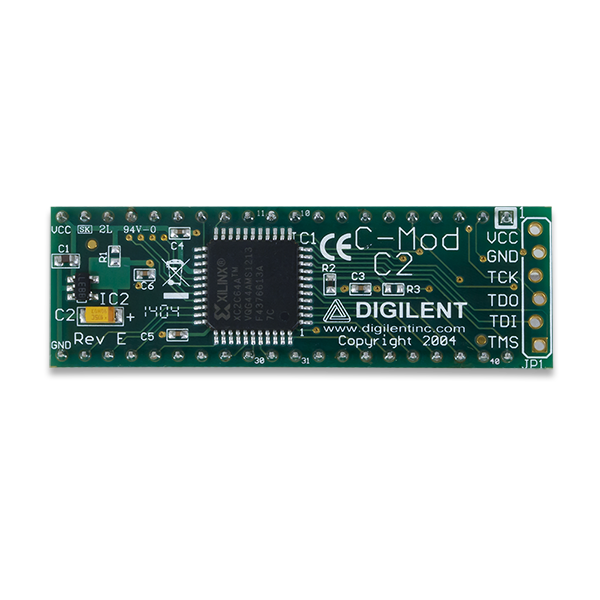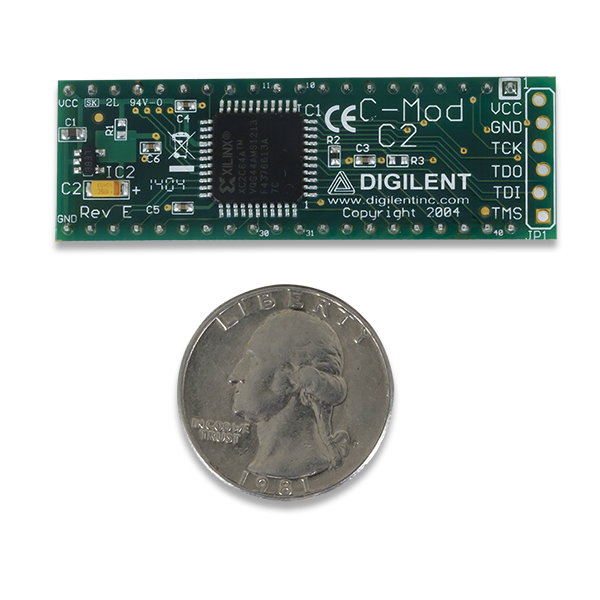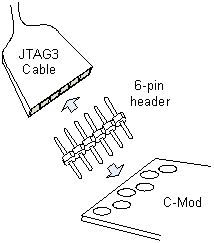Cmod Reference Manual
The Cmod C2 is retired and no longer for sale in our store.
Cmod boards combine a Xilinx CPLD, a JTAG programming port, and power supply circuits in a convenient 600-mil, 40-pin DIP package. Cmods are ideally suited for breadboard or other prototype circuit designs where the use of small surface mount packages is impractical.
Download This Reference Manual
Features
- A single 3.3V supply voltage (voltage regulation provided on Cmod board where required);
- Adequate bypass capacitance on all CPLD voltage supply pins;
- All available user I/O signals brought out to DIP pins;
- Once programmed, CPLD designs are non-volatile;
- Designs can easily be ported between Cmods using different CPLD device families;
- All Cmod boards are compatible with the free Xilinx WebPack tools.
Cmods were created to make the latest Xilinx CPLDs more practical for experimental and prototype circuits. They can plug directly in to breadboards or IC sockets, and they can mate with the Digilent Ceres™ board to utilize a collection of ready-made I/O circuits. Cmods are available with CoolRunner-II CPLD C2. Cmod boards are especially useful for investigating designs across a variety of CPLD families.
Functional Description
Cmod boards, which measure just 0.7” by 2.16”, allow designers to experiment with CPLD-based designs in a variety of state-of-the art devices. Designs can easily be ported from one Cmod to another, so that design performance in different devices can be compared and contrasted. The 40-pin DIP form factor allows Cmods to be used in breadboard or other through-hole circuits where surface-mount devices are impractical. They can be configured with a wide range logic circuits, from simple logic functions to sequential controllers. All available CPLD I/O signals are routed to the 40-pin DIP connections.
When used in conjunction with the Ceres board, Cmods can be used to rapidly implement CPLD based circuits, or to gain exposure to Xilinx CAD tools and CPLD-oriented design methods. The Ceres board provides Cmods with a power supply, a clock source, input buttons and switches, and various output LEDs. The Ceres/Cmod combination makes an excellent platform for use in teaching labs.
Cmods are programmed with a sample design during manufacturing. This design, available at the Digilent website, can be used to verify Cmod/Ceres function. It also provides a simple reference design example of a Xilinx project.
CPLD Configuration
Cmod boards contain a JTAG port for CPLD programming. The port consists of a pattern of six offset holes that are not loaded with header pins. To use this port, a row of six unattached header pins can be inserted into the end of a JTAG3 (or other) cable, and the other side of the header can be inserted into the offset hole patterns. Once the Cmod board is connected to the PC via the JTAG cable, the configuration software will automatically detect the CPLD.
To configure the board from a computer using the JTAG port, first ensure the Cmod is powered with a 3.3V supply (such as provided by the Ceres board), and that the JTAG cable is properly connected to the Cmod and to the computer. Start the configuration program (e.g., the iMPACT programmer available in the Xilinx WebPack tools), and the board will be auto-detected. Device programming and other JTAG operations are available in a pull-down menu made visible by right clicking on the device graphic in the programmer window.
| JTAG Signal | XC2C64 pin | XC9572XL pin | XCR3064 pin |
| TCK | 11 | 11 | 26 |
| TDI | 9 | 9 | 1 |
| TDO | 24 | 24 | 32 |
| TMS | 10 | 10 | 7 |
Power Supplies
Cmod boards require a single 3.3V supply on pin 20, and a single GND on pin 21. Current consumption is dependant on CPLD family, CPLD configuration, and external circuits. In most cases, current will be far less than 100mA, but the Xilinx data sheets for the particular CPLD should be referenced for more information.
CPLDs
Cmod boards are available with CoolRunner-2, CoolRunner (XPLA), and XC95 CPLDs. All available CPLD I/O signals are routed to the DIP connector, and the JTAG signals are routed to a programming connector. CPLD pinouts are provided in tables 2 and 3 below. Please see the data sheets for the CPLDs available at the Xilinx web site for more information.
| DIP PIN | Ceres Signal | Cmod C2 | Cmod 95 | Cmod XCR | ||||||
| 1 | CA | XC2C64 pin | type | Function Block | XC9572XL pin | type | Function Block | XCR3064 pin | type | Function Block |
| 2 | CB | 12 | IO | 4 | 12 | IO | 3 | 12 | IO | 4 |
| 3 | CC | 13 | IO | 4 | 13 | IO | 3 | 13 | IO | 4 |
| 4 | CD | 14 | IO | 4 | 14 | IO | 3 | 14 | IO | 4 |
| 5 | 16 | IO | 4 | 16 | IO | 3 | 15 | IO | 4 | |
| 6 | 7 | 3 | ||||||||
| 7 | ||||||||||
| 8 | ||||||||||
| 9 | CE | |||||||||
| 10 | CF | 18 | IO | 3 | 18 | 3 | 18 | IO | 3 | |
| 11 | CG | 19 | IO | 3 | 19 | 4 | 19 | IO | 3 | |
| 12 | AN3 | 20 | IO | 3 | 20 | 4 | 20 | IO | 3 | |
| 13 | AN2 | 21 | IO | 3 | 21 | 4 | 21 | IO | 3 | |
| 14 | AN1 | 22 | IO | 3 | 22 | 4 | 22 | IO | 3 | |
| 15 | AN0 | 23 | IO | 3 | 23 | 4 | 23 | IO | 3 | |
| 16 | SW7 | 27 | IO | 3 | 27 | 4 | 25 | IO | 3 | |
| 17 | DP | 28 | IO | 3 | 28 | 4 | 27 | IO | 1 | |
| 18 | BTN3 | 29 | IO | 3 | 29 | 2 | ||||
| 19 | 30 | GSR | 1 | 30 | 2 | 6 | IO | 2 | ||
| 20 | ||||||||||
| 20 | 15 | VCC | 26 | 9,17,29, 41 | VCC | |||||
| 20 | 7,26 | VCCIO | 15,35 | |||||||
| 21 | 35 | VAUX | ||||||||
| 22 | SW6 | 4,17,25 | GND | 4,17,25 | 16,24,36 | GND | ||||
| 23 | SW5 | 31 | GTS2 | 1 | 31 | 2 | 28 | IO | 1 | |
| 24 | SW4 | 32 | GTS3 | 1 | 32 | 2 | 30 | IO | 1 | |
| 25 | SW3 | 33 | GTS0 | 1 | 33 | 1 | 31 | IO | 1 | |
| 26 | SW2 | 34 | GTS1 | 1 | 34 | 2 | 33 | IO | 1 | |
| 27 | SW1 | 36 | IO | 1 | 36 | 2 | 34 | IO | 1 | |
| 28 | BTN2 | 37 | IO | 1 | 37 | 2 | 35 | IO | 1 | |
| 29 | SW0 | 38 | IO | 1 | 38 | 2 | 37 | IN3/CLK3 | ||
| 30 | LED7 | 39 | IO | 2 | 39 | 1 | 42 | IO | 2 | |
| 31 | LED6 | 40 | IO | 2 | 40 | 1 | 43 | IO | 2 | |
| 32 | LED5 | 41 | IO | 2 | 41 | 1 | 44 | IO | 2 | |
| 33 | BTN0 | 42 | IO | 2 | 42 | 1 | 2 | IO | 2 | |
| 34 | BTN1 | 43 | GCK0 | 2 | 43 | 1 | 40 | IN0/CLK0 | ||
| 35 | MCLK | 44 | GCK1 | 2 | 44 | 1 | 39 | IN1/CLK1 | ||
| 36 | LED4 | 1 | GCK2 | 2 | 1 | 1 | 38 | IN2/CLK2 | ||
| 37 | LED3 | 2 | IO | 2 | 2 | 1 | 3 | IO | 2 | |
| 38 | LED2 | 3 | IO | 2 | 3 | 1 | 5 | IO | 2 | |
| 39 | LED1 | 5 | IO | 4 | 5 | 3 | 8 | IO | 4 | |






